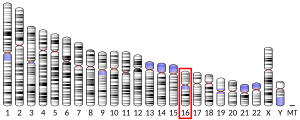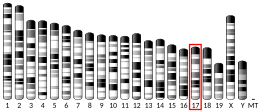Methionine-R-sulfoxide reductase B1 is an enzyme that in humans is encoded by the SEPX1 gene .[ 5] [ 6]
This gene encodes a selenoprotein, which contains a selenocysteine (Sec) residue at its active site. The selenocysteine is encoded by the UGA codon that normally signals translation termination. The 3' UTR of selenoprotein genes have a common stem-loop structure, the sec insertion sequence (SECIS), that is necessary for the recognition of UGA as a Sec codon rather than as a stop signal. This protein belongs to the methionine sulfoxide reductase B (MsrB) family, and it is expressed in a variety of adult and fetal tissues.[ 6]
Bonaldo MF, Lennon G, Soares MB (1997). "Normalization and subtraction: two approaches to facilitate gene discovery" . Genome Res . 6 (9): 791–806. doi :10.1101/gr.6.9.791 PMID 8889548 . Kryukov GV, Kryukov VM, Gladyshev VN (1999). "New mammalian selenocysteine-containing proteins identified with an algorithm that searches for selenocysteine insertion sequence elements" . J. Biol. Chem . 274 (48): 33888–97. doi :10.1074/jbc.274.48.33888 PMID 10567350 . Zhang QH, Ye M, Wu XY, et al. (2001). "Cloning and functional analysis of cDNAs with open reading frames for 300 previously undefined genes expressed in CD34+ hematopoietic stem/progenitor cells" . Genome Res . 10 (10): 1546–60. doi :10.1101/gr.140200 . PMC 310934 PMID 11042152 . Daniels RJ, Peden JF, Lloyd C, et al. (2001). "Sequence, structure and pathology of the fully annotated terminal 2 Mb of the short arm of human chromosome 16" . Hum. Mol. Genet . 10 (4): 339–52. doi :10.1093/hmg/10.4.339 PMID 11157797 . Moskovitz J, Singh VK, Requena J, et al. (2002). "Purification and characterization of methionine sulfoxide reductases from mouse and Staphylococcus aureus and their substrate stereospecificity" . Biochem. Biophys. Res. Commun . 290 (1): 62–5. doi :10.1006/bbrc.2001.6171 . PMID 11779133 . Strausberg RL, Feingold EA, Grouse LH, et al. (2003). "Generation and initial analysis of more than 15,000 full-length human and mouse cDNA sequences" . Proc. Natl. Acad. Sci. U.S.A . 99 (26): 16899–903. Bibcode :2002PNAS...9916899M . doi :10.1073/pnas.242603899 PMC 139241 PMID 12477932 . Kim HY, Gladyshev VN (2004). "Methionine sulfoxide reduction in mammals: characterization of methionine-R-sulfoxide reductases" . Mol. Biol. Cell . 15 (3): 1055–64. doi :10.1091/mbc.E03-08-0629 . PMC 363075 PMID 14699060 . Gerhard DS, Wagner L, Feingold EA, et al. (2004). "The status, quality, and expansion of the NIH full-length cDNA project: the Mammalian Gene Collection (MGC)" . Genome Res . 14 (10B): 2121–7. doi :10.1101/gr.2596504 . PMC 528928 PMID 15489334 .



